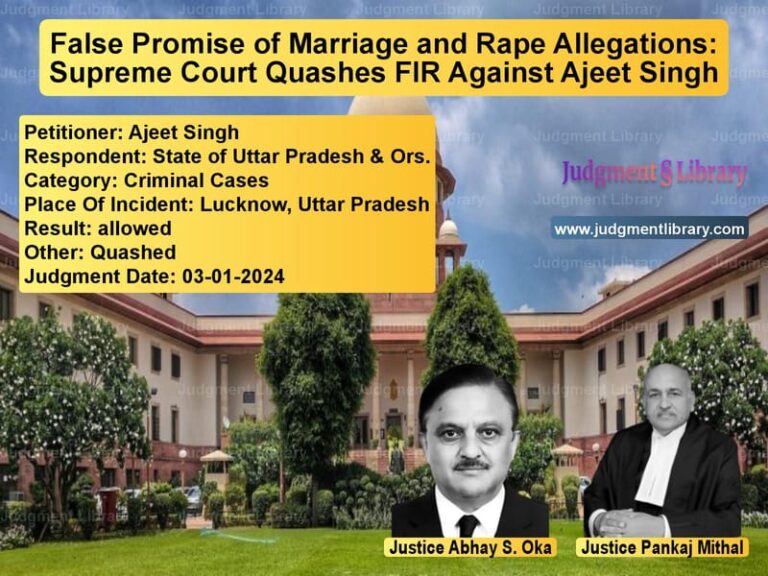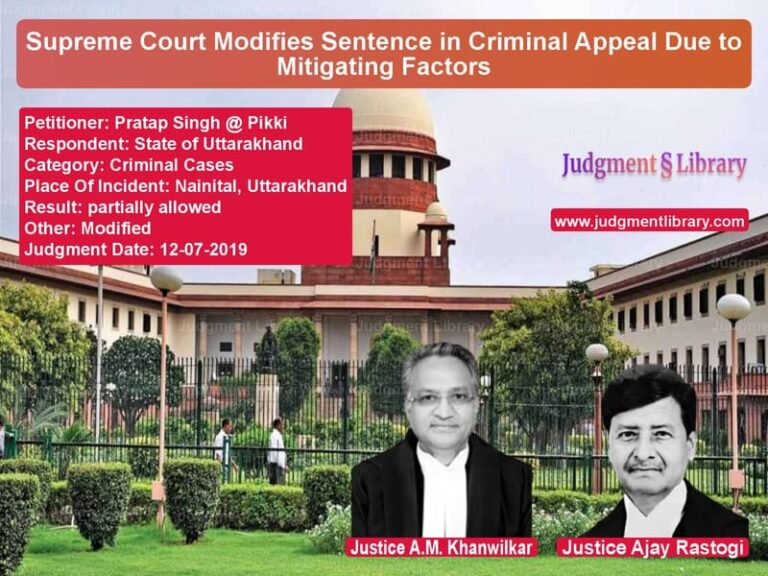Supreme Court Directs Madhya Pradesh to Reassess 75% Reservation in B.Ed Admissions
The Supreme Court of India recently ruled in favor of Veena Vadini Teachers Training Institute, challenging the Madhya Pradesh government’s policy of reserving 75% of B.Ed (Part-time) seats for state residents. The Court found this policy excessive and violative of constitutional principles laid down in previous judgments, directing the state to review and reduce the reservation percentage for future academic sessions.
Background of the Case
Veena Vadini Teachers Training Institute, a Gwalior-based educational institution, provides teacher training programs, including B.Ed (Part-time) for in-service teachers. The institute was among the few permitted to offer this course in Madhya Pradesh. The dispute arose when the state government issued its ‘Admission Process and Guiding Principles 2022-2023’ policy, reserving 75% of seats for Madhya Pradesh residents, leaving only 25% open to students from other states.
The institute argued that the rigid reservation policy had led to a large number of unfilled seats, as many Madhya Pradesh residents were not applying for the program. The appellant challenged the policy before the Madhya Pradesh High Court, which upheld it, relying on the 2007 judgment in Preston College v. State of M.P. The institute then approached the Supreme Court, arguing that the reservation policy was unconstitutional and prevented eligible students from outside the state from filling vacant seats.
Petitioner’s Arguments (Veena Vadini Teachers Training Institute)
- The state’s policy reserving 75% of B.Ed seats for Madhya Pradesh residents was excessive and violated Articles 14, 15, and 19(1)(g) of the Constitution.
- Data from the past two academic years (2021-2022 and 2022-2023) showed that almost all the reserved seats remained vacant:
- In 2021-2022, only 4 out of 75 seats under the Madhya Pradesh quota were filled, while 71 remained vacant.
- In 2022-2023, only 2 out of 75 seats were filled, with 73 vacant.
- Despite these vacant seats, the state government did not allow the institute to admit eligible candidates from outside Madhya Pradesh.
- The reservation was arbitrary and went against the principles laid down in Pradeep Jain v. Union of India (1984), which held that state domicile reservations should not exceed 70%.
- The policy did not serve its intended purpose and led to wastage of educational resources.
Respondent’s Arguments (State of Madhya Pradesh)
- The state was within its right to reserve seats for its residents to ensure educational and professional opportunities for locals.
- The policy was based on historical precedents and was upheld in Preston College v. State of M.P. (2007).
- The government had the authority to regulate admissions under its education policies, and the courts should not interfere.
- Reservation for state residents was justified as it helped in building local educational capacity and addressing teacher shortages within Madhya Pradesh.
Supreme Court’s Observations
- The Court reaffirmed that while residence-based reservations are permissible, excessive reservations that lead to unfilled seats must be reviewed.
- It relied on Pradeep Jain v. Union of India (1984), which held that state domicile-based reservations in educational institutions should not exceed 70%.
- The Court found that the government had failed to justify why such a high percentage was required when data showed that these seats were not being filled.
- The judgment emphasized that educational institutions should not suffer from unfilled seats when eligible candidates are available from outside the state.
- The Court rejected the reliance on Preston College, noting that it was decided before more recent developments in education policy and constitutional interpretation.
Key Judicial Findings
- The Court recognized that states could implement domicile-based reservations but must ensure that these policies serve their intended purpose.
- It ruled that reservation policies must be data-driven and adaptable to actual enrollment trends.
- Large-scale unfilled seats due to excessive reservations frustrate the objectives of education policy and must be reconsidered.
- The judgment reaffirmed the constitutional principle that reservations should not amount to a wholesale exclusion of non-residents.
Final Judgment
The Supreme Court ruled in favor of the petitioner:
- The Madhya Pradesh government was directed to reassess the 75% reservation quota and reduce it in accordance with constitutional principles.
- While the Court refrained from altering the 2022-2023 admissions, it ordered the government to implement changes for the next academic session.
- The government was instructed to review past admission data and set a more reasonable reservation percentage.
- The state was given two months to complete this reassessment and implement necessary changes.
Implications of the Judgment
The ruling has major implications for domicile-based reservations in education:
- Restriction on Excessive Reservations: The decision establishes a precedent that excessive state-based reservations must be reviewed if they result in unfilled seats.
- Data-Driven Policy Making: The government must rely on actual enrollment data before implementing reservation policies.
- National Access to Education: The ruling ensures that qualified candidates from other states are not unfairly excluded from educational opportunities.
- State Discretion with Judicial Oversight: While states retain the power to regulate admissions, they must ensure that policies comply with constitutional principles and serve their intended purpose.
Conclusion
The Supreme Court’s ruling in Veena Vadini Teachers Training Institute v. State of Madhya Pradesh is a landmark decision that brings much-needed scrutiny to domicile-based reservation policies in higher education. The Court’s directive to reassess and reduce the 75% reservation ensures that state policies are fair, reasonable, and aligned with national educational goals. By striking a balance between state interests and access to education, this judgment sets an important precedent for future education policy reforms in India.
Petitioner Name: Veena Vadini Teachers Training Institute.Respondent Name: State of Madhya Pradesh & Ors..Judgment By: Justice Dinesh Maheshwari, Justice Sudhanshu Dhulia.Place Of Incident: Madhya Pradesh, India.Judgment Date: 28-04-2023.
Don’t miss out on the full details! Download the complete judgment in PDF format below and gain valuable insights instantly!
Download Judgment: veena-vadini-teacher-vs-state-of-madhya-prad-supreme-court-of-india-judgment-dated-28-04-2023.pdf
Directly Download Judgment: Directly download this Judgment
See all petitions in Education Related Cases
See all petitions in Fundamental Rights
See all petitions in Public Interest Litigation
See all petitions in Judgment by Dinesh Maheshwari
See all petitions in Judgment by Sudhanshu Dhulia
See all petitions in partially allowed
See all petitions in Modified
See all petitions in supreme court of India judgments April 2023
See all petitions in 2023 judgments
See all posts in Constitutional Cases Category
See all allowed petitions in Constitutional Cases Category
See all Dismissed petitions in Constitutional Cases Category
See all partially allowed petitions in Constitutional Cases Category







